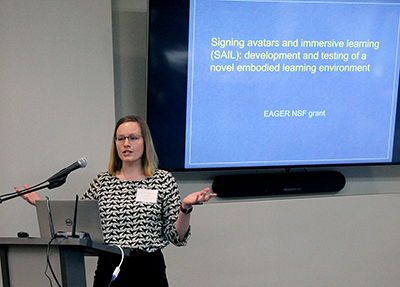About the CBI

The AccessCyberlearning 2.0 Synthesis and Design Workshop is funded by the National Science Foundation’s (NSF) Cyberlearning and Future Learning Technologies program of the Division of Information and Intelligent Systems (#1824450). AccessCyberlearning 2.0 aims to conduct exploratory research to inform the design of the next generation of digital learning environments for science, technology, engineering, and mathematics (STEM) content.
Led by the DO-IT (Disabilities, Opportunities, Internetworking, and Technology) Center—which has decades of expertise in designing welcoming, accessible, and usable websites, documents, videos, and digital learning activities—the AccessCyberlearning 2.0 Synthesis and Design Workshop sought to answer four research questions that emerged from its current AccessCyberlearning project which is also funded by NSF (#1550477):
- What challenges do learners with different types of disabilities face in using current and emerging digital learning tools and engaging in online learning activities?
- How do current digital learning research and practices contribute to the marginalization of individuals with disabilities?
- What advances in digital learning design are required to support multi-modal learning and engagement that is fully accessible to and usable by students with disabilities?
- What specific actions can digital learning researchers, funding agencies, educators, and other stakeholders take to systematically address issues with respect to disabilities?
To address these questions, the 2.5-day synthesis and design workshop and follow-up engagement will
- synthesize and integrate existing research related to the accessibility of digital learning to students with a variety of disabilities;
- produce a white paper which addresses the research questions and contributes to the development of forward-looking, highly adaptable, distributed, collaborative digital environments that can personalize learning for diverse learners that include individuals with disabilities with potential applications across multiple and varying (a) domains of knowledge, (b) learning contexts, and (c) time spans; and
- develop guidelines for how researchers can address disability/accessibility-related issues with respect to (a) designing and testing new technologies, (b) analyzing and reporting outcomes, and (c) designing project activities and resources.
In this CBI
- all participants contributed to its success;
- experts in all topic areas were in the audience; and
- new concepts evolved from presentations and discussions.
The CBI included presentations, panel discussions, and group discussions where CBI participants shared their diverse perspectives and expertise. The agenda for the CBI and summaries of the presentations are provided on the following pages.